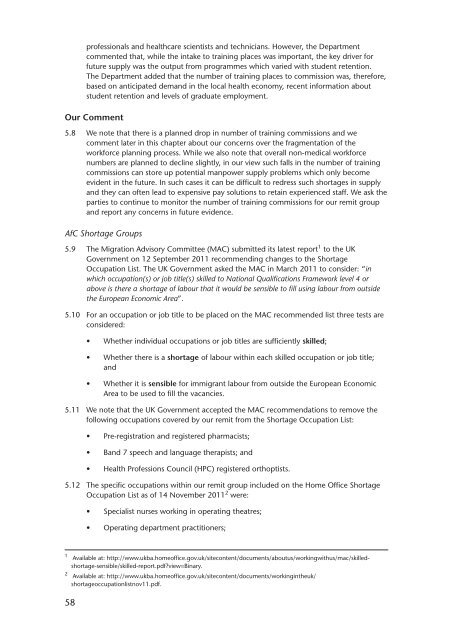NHS pay review body: twenty-sixth report 2012 - Official Documents
NHS pay review body: twenty-sixth report 2012 - Official Documents
NHS pay review body: twenty-sixth report 2012 - Official Documents
Create successful ePaper yourself
Turn your PDF publications into a flip-book with our unique Google optimized e-Paper software.
58<br />
professionals and healthcare scientists and technicians. However, the Department<br />
commented that, while the intake to training places was important, the key driver for<br />
future supply was the output from programmes which varied with student retention.<br />
The Department added that the number of training places to commission was, therefore,<br />
based on anticipated demand in the local health economy, recent information about<br />
student retention and levels of graduate employment.<br />
Our Comment<br />
5.8<br />
We note that there is a planned drop in number of training commissions and we<br />
comment later in this chapter about our concerns over the fragmentation of the<br />
workforce planning process. While we also note that overall non-medical workforce<br />
numbers are planned to decline slightly, in our view such falls in the number of training<br />
commissions can store up potential manpower supply problems which only become<br />
evident in the future. In such cases it can be difficult to redress such shortages in supply<br />
and they can often lead to expensive <strong>pay</strong> solutions to retain experienced staff. We ask the<br />
parties to continue to monitor the number of training commissions for our remit group<br />
and <strong>report</strong> any concerns in future evidence.<br />
AfC Shortage Groups<br />
5.9<br />
5.10<br />
5.11<br />
5.12<br />
1 The Migration Advisory Committee (MAC) submitted its latest <strong>report</strong> to the UK<br />
Government on 12 September 2011 recommending changes to the Shortage<br />
Occupation List. The UK Government asked the MAC in March 2011 to consider: “in<br />
which occupation(s) or job title(s) skilled to National Qualifications Framework level 4 or<br />
above is there a shortage of labour that it would be sensible to fill using labour from outside<br />
the European Economic Area”.<br />
For an occupation or job title to be placed on the MAC recommended list three tests are<br />
considered:<br />
• Whether individual occupations or job titles are sufficiently skilled;<br />
• Whether there is a shortage of labour within each skilled occupation or job title;<br />
and<br />
• Whether it is sensible for immigrant labour from outside the European Economic<br />
Area to be used to fill the vacancies.<br />
We note that the UK Government accepted the MAC recommendations to remove the<br />
following occupations covered by our remit from the Shortage Occupation List:<br />
•<br />
•<br />
•<br />
Pre-registration and registered pharmacists;<br />
Band 7 speech and language therapists; and<br />
Health Professions Council (HPC) registered orthoptists.<br />
The specific occupations within our remit group included on the Home Office Shortage<br />
Occupation List as of 14 November 20112 were:<br />
•<br />
•<br />
Specialist nurses working in operating theatres;<br />
Operating department practitioners;<br />
1<br />
Available at: http://www.ukba.homeoffice.gov.uk/sitecontent/documents/aboutus/workingwithus/mac/skilledshortage-sensible/skilled-<strong>report</strong>.pdf?view=Binary.<br />
2<br />
Available at: http://www.ukba.homeoffice.gov.uk/sitecontent/documents/workingintheuk/<br />
shortageoccupationlistnov11.pdf.
















